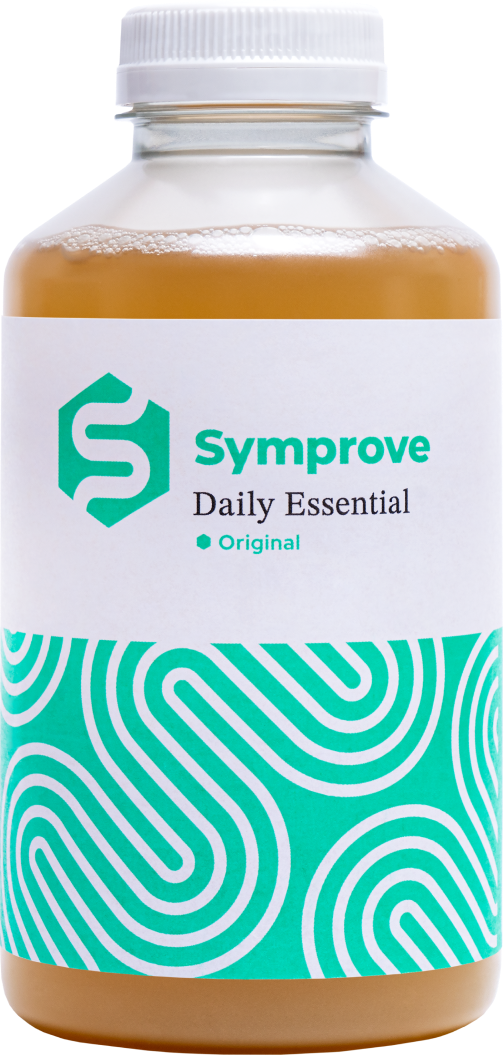Ageing is determined by complex interactions between genetic and environmental factors. Research to date suggests that alterations to the gut microbiome may lie at the core of many age-associated changes, including immune system dysregulation, metabolic alterations, and susceptibility to disease, for example cardiovascular disease, rheumatoid arthritis and type II diabetes, although it remains unclear whether these alterations are a cause or consequence of ageing.(1-3)
The gut microbiome across the lifespan
With life expectancy in the UK doubling over the last 200 years, the importance of gut health and its influence on ageing should not be underestimated. Recent evidence suggests that the gut microbiome starts to develop in utero, and is shaped by many factors including; mode of birth delivery (vaginally born or C-section), feeding (breastfed or formula fed), and exposure to medications (e.g. antibiotics). After birth, there is a critical window in the first 1000 days of life,(4) which provides a pivotal opportunity for modulating the gut microbiome, a highly dynamic metabolically active ecosystem which is sensitive to environmental factors, to promote healthy growth and development throughout the lifespan. The gut microbiome continues to evolve and is thought to resemble an adult-like structure by the age of three years old. Notably, it is considered to have a high level of plasticity and can be manipulated depending on what it is exposed to throughout the lifespan (e.g. diet, physical activity, sleep, stress).
The gut microbiome, the majority of which resides in the large intestine, is made up of trillions of microorganisms including bacteria, viruses, archaea, and eukaryotes, which have evolved with us to form a symbiotic relationship to support host health. In fact, 70% of our immune system resides along our gastrointestinal tract. As we age, research has demonstrated compositional and functional changes (e.g.decline in metabolites such as short chain fatty acids) in the gut microbiome, often referred to as ‘dysbiosis’ whereby older individuals have been shown to have a different gut microbiome profile often characterised by lower gut microbial diversity. For example, lower proportions of Enterobacteria and Bifidobacterium, and increased proportions of Bacteroides, Eubacterium and Clostridiaceae have been observed with increased age. These compositional changes have been associated with several age-related diseases and may be due to a number of reasons including altered functionality and physiology of the gastrointestinal tract, recurrent infections, medication use, reduced mobility and a weakened immune system.
Other age-related changes
Immunity and inflammation
Advancement of age is often associated with declining physiological functions and poor health outcomes. Two of the most recognised contributing factors include firstly, impairment or deterioration of the immune system, (i.e. immunosenescence) which is defined as the state of deregulated immune function (e.g. lower natural killer cell activity, reduced response of immune T cells) contributing to increased susceptibility to infections. Secondly and concurrently, a chronic low-grade pro-inflammatory state (termed ‘inflammaging’) which likely contributes to the pathophysiology of several age-related diseases such as cardiovascular disease, dementia, stroke, neurological disorders, osteoporosis, and cancer.
The gastrointestinal tract
Perhaps uniquely, the structure, function, and so permeability of the small intestine is maintained with ageing under normal conditions. However, small intestinal bacterial overgrowth (SIBO), defined by an abnormal increase in the number of microorganisms in the small intestine, is often found in elderly people and associated with nutrient malabsorption and diarrhoea, which in turn leads to malnutrition and weight loss. In the large intestine, there is evidence of digestive changes (e.g. prolonged transit time) which can predispose individuals to gut-related issues such as Gastroesophageal reflux disease (GERD), constipation, and diverticular disease.
Malnutrition and illness
Elderly people are also at a higher risk of malnutrition. This is due to poor dentition, swallowing and chewing difficulties and loss of appetite that may interfere with eating, loss of smell or taste sensations. Chronic illnesses including head and neck and cancers of the digestive system, may interfere with the digestion or absorption of food, and increase nutritional requirements further contributing to the risk of malnutrition. In addition, social isolation, functional and cognitive impairments can all be barriers to obtaining food and adequate nutrition in elderly people, resulting in malnutrition. Clostridium difficile infection which affects mainly hospitalised patients, particularly the elderly was associated with gut microbial alterations including significant depletion of some protective taxa and overrepresentation of opportunistic pathogens.
Medication use
Multiple medication use taken simultaneously (labelled as polypharmacy) is commonly observed among older people. Indeed, polypharmacy has been associated with gut microbial dysbiosis in older hospitalised patients while another study that investigated over 1,000 marketed drugs found that 24% inhibited the growth of at least one strain in-vitro. The implications of repeated antibiotics and the adverse effects on the gut microbiome is well known with studies showing disruption including reduced diversity.
Nutrition, gut health, and ageing recommendations
Focussing on gut health as we age is key to maintaining overall health. This is influenced by many factors including dietary intake and lifestyle (e.g. stress, sleep pattern, physical activity). While diet and nutrition is not a medicine, it can be used to reduce an individual’s risk of disease. A diverse, stable and resilient gut microbiome is associated with better health outcomes during the aging process.(5)
-
Vitamin D
Sunlight is our main source of vitamin D. As it is absorbed by our skin it undergoes a 2-stage process of hydroxylation. Combined factors such as spending less time outside and a reduced efficiency of producing vitamin D from sunlight as we age, it is recommended all adults over the age of 65 should take a supplement containing 10µg of vitamin D daily and regularly eat foods containing vitamin D such as oily fish and fortified breakfast cereals. -
Plant-based foods
Include as many different plant-foods as possible (e.g. fruits, vegetables, wholegrains, nuts, seeds, beans, lentils, and other legumes). Research from the American Gut Project showed that including 30+ plant-foods a week compared to 10 per week helps support gut microbiome diversity. Furthermore, plant-based foods are packed with fibre, which is important both for maintenance of blood glucose levels, reducing LDL cholesterol and supporting our gut microbiome. One mechanism through which plant-foods may do this is the phytochemicals. For example, polyphenols interact with the gut microbiome, bile acids, nutrient digestion and absorption, and other food components in the gut, and are associated with upregulating health-promoting bacteria. Naturally occurring prebiotics found in foods such as onions, garlic, asparagus, artichoke, chicory and banana, are types of non-digestible carbohydrates (i.e. dietary fibre) that only our gut microbes can utilise. More research is needed to understand prebiotics, but evidence does suggest that prebiotics increase calcium absorption and contribute to bone health. -
Probiotics
Probiotics are considered health-promoting bacteria found in food products (e.g. yogurts and some fermented foods). As with prebiotics, more research is needed on probiotics, but evidence suggests consumption of probiotics may support the gut microbiome via several mechanisms. These include sharing genes and metabolites, supporting challenged microbiota, and directly influencing epithelial and immune cells, improving the diversity of the gut microbiome which may help to delay and/ or prevent unhealthy ageing and frailty. Individuals may consider incorporating a probiotic food product into their daily routine if found to be beneficial, enjoyable and sustainable from an affordability perspective. -
The Mediterranean diet
Following a dietary pattern such as The Mediterranean diet has been long associated with health and more recently modulation of the gut microbiome which in turn has the potential to promote healthier ageing and provide protection against specific diseases. A Mediterranean diet which is typically higher in fruit, legumes, vegetables, fish and wholegrains is associated with increased intakes of dietary fibre and an improved ratio of fats (lower saturated and higher polyunsaturated). -
Varied Dietary Patterns and Energy
With our senses including taste and smell changing as we age, it is important to consume a diet which provide adequate calorie intake which can be achieved with smaller and more frequent meals. It is also important to ensure textures are manageable and appropriate such as a soft, moister consistency and challenging diminished senses by experimenting with herbs and spices and adding salty, bitter, sour, sharp-tasting ingredients to dishes.
Overall, while more research is needed, it is clear there is an association between the gut microbiome and health as we age. With this in mind, the focus of future research is likely to be on the potential development of novel approaches for healthier ageing by targeting the gut. Please see below for further resources.
Resources
-
Age UK
As a network of local Age UK groups across the country that have opportunities for you to become either an Active Buddy, who helps someone become more physically active, a Befriender, who visits someone who lives alone, or a day centre helper. -
Independent Age
A befriending service who will match a volunteer with an older person who you are drop in on regularly for a coffee and chat. This is so important as one factor of reduced food consumption is loneliness. -
Guts UK
A charity for the digestive system, aiming to provide expert information, and raise awareness of gut health to the public, and fund vital research. -
The British Nutrition Foundation
For more guidance on eating a balanced diet as we age you can look here. -
British Dietetics Association
Have plenty of resources for older adult’s food facts here.
The above blog was written in association with www.begoodtoyourgut.com.uk intern Emilia Fish BSc (Hons) Food Science & Nutrition, ANutr nutritionnourishment.com


